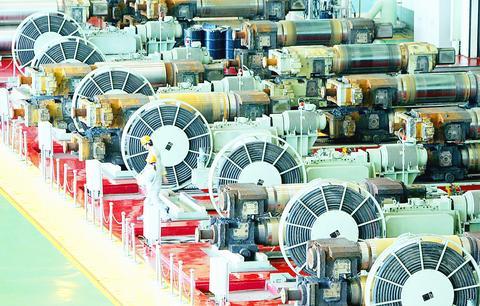China's government will step up its lending curbs and investment restrictions because industrial expansion by state companies has yet to be reined in sufficiently, Vice Premier Zeng Peiyan (曾培炎) said.
"We must increase structural adjustments," Zeng said in a speech to the World Economic Forum's China Business Summit in Beijing. "Macroeconomic adjustments have been effective, but these are just initial results. We can't relax the campaign."

PHOTO: EPA
China's industrial production growth picked up last month for the first time in six months, the government said Friday, suggesting lending curbs are having less of an impact. Inflation, which may be reported today, is forecast to have accelerated from a seven-year high, a Bloomberg survey showed.
"The government was too slow to implement measures to cool fixed-asset investment," Bruce Murray, chief representative of the Asian Development Bank in Beijing, said. "That's why the policies haven't been as effective as they might."
China has clamped down on lending to the steel, cement, real estate and other industries to cool an investment boom that it blames for causing power shortages, clogging transport links and driving up raw materials prices.
INVESTMENTS
China's investment in factories, roads and other fixed assets rose 32 percent from a year earlier last month, Wu Jinglian (
Zeng said the government will extend the loan crackdown to make it more difficult for state companies to expand. Authorities will continue to monitor investment in industries such as steel, autos and property, he said.
The central government plans to pare the number of business licenses and approvals required in an attempt to make the economy more market-oriented and reduce the influence of the state, Minister of the National Development and Reform Commission Ma Kai (馬凱) said at the forum.
Ma, who has berated local governments this year for fuelling "blind" and "haphazard" investments, said this year's slowdown in fixed-asset investment showed the government was right to use administrative measures to slow the economy.
"History will prove that this regulation avoided big ups and downs in the Chinese economy," Ma said. "We have to constantly enrich the content of macro regulation."
Interest rates
Economists including Qu Hongbin (
China should hold off from raising rates as higher borrowing costs may deter private investment, which is needed to drive economic growth and create jobs, said Cheng Siwei (程思危), vice chairman of the National People's Congress.
"We want to improve the effectiveness and efficiency of our investments," he said at the forum. "China doesn't want to slow economic growth."
Central bank Governor Zhou Xiaochuan (周小川) said last week that policy makers will decide whether to raise interest rates after reviewing last month's economic reports. China's inflation rate matches the People's Bank of China's one-year lending rate, which has been held at 5.31 percent since February 2002 and was last raised in 1995.
The central bank on Friday rejected media reports that it's told commercial lenders to prepare for a rate increase next month.

‘SWASTICAR’: Tesla CEO Elon Musk’s close association with Donald Trump has prompted opponents to brand him a ‘Nazi’ and resulted in a dramatic drop in sales Demonstrators descended on Tesla Inc dealerships across the US, and in Europe and Canada on Saturday to protest company chief Elon Musk, who has amassed extraordinary power as a top adviser to US President Donald Trump. Waving signs with messages such as “Musk is stealing our money” and “Reclaim our country,” the protests largely took place peacefully following fiery episodes of vandalism on Tesla vehicles, dealerships and other facilities in recent weeks that US officials have denounced as terrorism. Hundreds rallied on Saturday outside the Tesla dealership in Manhattan. Some blasted Musk, the world’s richest man, while others demanded the shuttering of his

TIGHT-LIPPED: UMC said it had no merger plans at the moment, after Nikkei Asia reported that the firm and GlobalFoundries were considering restarting merger talks United Microelectronics Corp (UMC, 聯電), the world’s No. 4 contract chipmaker, yesterday launched a new US$5 billion 12-inch chip factory in Singapore as part of its latest effort to diversify its manufacturing footprint amid growing geopolitical risks. The new factory, adjacent to UMC’s existing Singapore fab in the Pasir Res Wafer Fab Park, is scheduled to enter volume production next year, utilizing mature 22-nanometer and 28-nanometer process technologies, UMC said in a statement. The company plans to invest US$5 billion during the first phase of the new fab, which would have an installed capacity of 30,000 12-inch wafers per month, it said. The

Taiwan’s official purchasing managers’ index (PMI) last month rose 0.2 percentage points to 54.2, in a second consecutive month of expansion, thanks to front-loading demand intended to avoid potential US tariff hikes, the Chung-Hua Institution for Economic Research (CIER, 中華經濟研究院) said yesterday. While short-term demand appeared robust, uncertainties rose due to US President Donald Trump’s unpredictable trade policy, CIER president Lien Hsien-ming (連賢明) told a news conference in Taipei. Taiwan’s economy this year would be characterized by high-level fluctuations and the volatility would be wilder than most expect, Lien said Demand for electronics, particularly semiconductors, continues to benefit from US technology giants’ effort

Minister of Finance Chuang Tsui-yun (莊翠雲) yesterday told lawmakers that she “would not speculate,” but a “response plan” has been prepared in case Taiwan is targeted by US President Donald Trump’s reciprocal tariffs, which are to be announced on Wednesday next week. The Trump administration, including US Secretary of the Treasury Scott Bessent, has said that much of the proposed reciprocal tariffs would focus on the 15 countries that have the highest trade surpluses with the US. Bessent has referred to those countries as the “dirty 15,” but has not named them. Last year, Taiwan’s US$73.9 billion trade surplus with the US